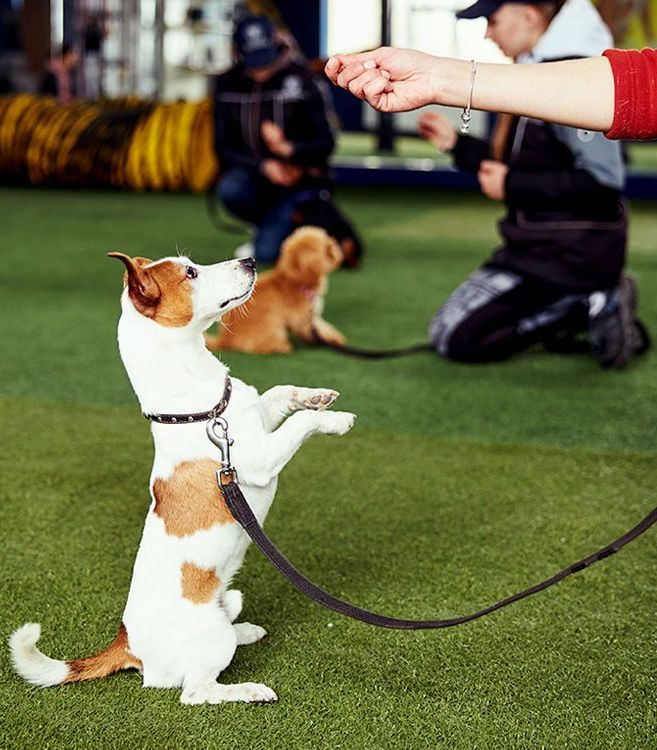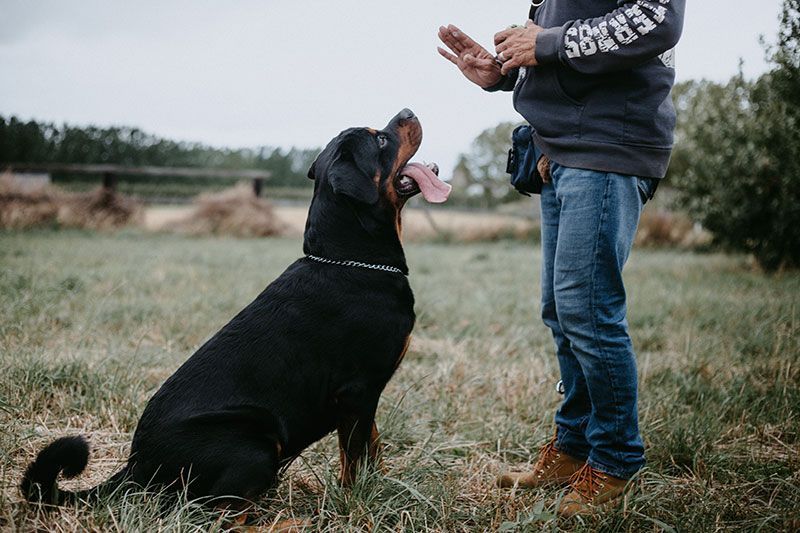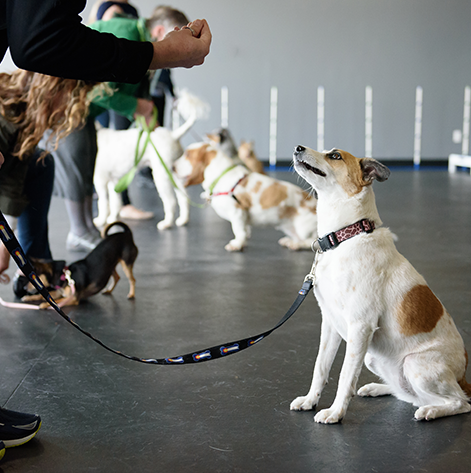Puppy Obedience Training: An Investment With Lifelong Benefits
Puppy Training is Essential
It is a special and exciting moment for every household to bring home a sweet new puppy. The first few moments are spent introducing the puppy to its new family members, followed by allowing the puppy to explore its new home. Whether your puppy is assigned an indoor or outdoor living space, you can be sure to expect a lot of sniffing around, some hesitancy towards its new surroundings, and even a surprise puddle or two as the puppy claims its new territory. A few days pass and the nights seem longer, filled with multiple awakenings by a crying puppy needing attention or a guide to its designated bathroom area. Soon, left out shoes and socks become chew toys, the edge of the sofa has become shredded, and the plants in the yard are scattered across the lawn. The special and exciting feelings that were first felt upon bringing home a new puppy have been replaced by frustration and defeat as it becomes apparent the puppy does not come fully trained, but is instead, a tiny gift of chaos.
The good news is your puppy is actually an eager student waiting to be taught the standards for which it is expected to live by. It’s important to note that all of your interactions with your puppy are potential lessons; everything from the way you greet them (are you allowing them to jump up at you?) to how you walk them on a leash (are they really the ones leading?) will teach your puppy what is and isn’t acceptable behavior. Puppies are willing and ready to begin learning positive manners and habits as soon as you bring them home. The best time to start puppy obedience is now! Puppies as young as 8 weeks old have the capacity to learn the basics of obedience, but remember: the younger the puppy, the shorter the attention span. Puppy training lessons should be short, fun and supplemented with many opportunities for play!
Puppies learn best when they are well-rested and not
too excited. They are also more keen to pay attention in a familiar, distraction-free environment. Eventually, you and your puppy will transition to working outside and in new spaces, but the initial training stages should be within a low-key setting so that it is easy for your pup to focus on you or its trainer. Group or personal puppy obedience training is the best option for setting your puppy up for success. A puppy obedience trainer will be able to teach your puppy what the household and behavior expectations are, as well as show them that you are its leader by teaching you how to give commands. Group training will allow your puppy to develop social skills in a controlled environment, making your pup a happy and confident dog!
Speak With A Dog
Training Expert
Speak With A Dog Training Expert
Thank you for contacting us!
We will contact you shortly!
Please try again later.

Puppy Training is Essential
It is a special and exciting moment for every household to bring home a sweet new puppy. The first few moments are spent introducing the puppy to its new family members, followed by allowing the puppy to explore its new home. Whether your puppy is assigned an indoor or outdoor living space, you can be sure to expect a lot of sniffing around, some hesitancy towards its new surroundings, and even a surprise puddle or two as the puppy claims its new territory. A few days pass and the nights seem longer, filled with multiple awakenings by a crying puppy needing attention or a guide to its designated bathroom area. Soon, left out shoes and socks become chew toys, the edge of the sofa has become shredded, and the plants in the yard are scattered across the lawn. The special and exciting feelings that were first felt upon bringing home a new puppy have been replaced by frustration and defeat as it becomes apparent the puppy does not come fully trained, but is instead, a tiny gift of chaos.
Speak With A Dog
Training Expert
Speak With A Dog Training Expert
Thank you for contacting us!
We will contact you shortly!
Please try again later.
The good news is your puppy is actually an eager student waiting to be taught the standards for which it is expected to live by. It’s important to note that all of your interactions with your puppy are potential lessons; everything from the way you greet them (are you allowing them to jump up at you?) to how you walk them on a leash (are they really the ones leading?) will teach your puppy what is and isn’t acceptable behavior. Puppies are willing and ready to begin learning positive manners and habits as soon as you bring them home. The best time to start puppy obedience is now! Puppies as young as 8 weeks old have the capacity to learn the basics of obedience, but remember: the younger the puppy, the shorter the attention span. Puppy training lessons should be short, fun and supplemented with many opportunities for play!
Puppies learn best when they are well-rested and not
too excited. They are also more keen to pay attention in a familiar, distraction-free environment. Eventually, you and your puppy will transition to working outside and in new spaces, but the initial training stages should be within a low-key setting so that it is easy for your pup to focus on you or its trainer. Group or personal puppy obedience training is the best option for setting your puppy up for success. A puppy obedience trainer will be able to teach your puppy what the household and behavior expectations are, as well as show them that you are its leader by teaching you how to give commands. Group training will allow your puppy to develop social skills in a controlled environment, making your pup a happy and confident dog!


Is There A Need For A Professional Dog Trainer?
Once your puppy has completed professional training, it is important to continue building on training behaviors. One option is to sign up for advanced behavioral training. This will teach your puppy leash manners, increase its cue obeying reaction time, and allow your puppy to continue working on behaviors learned in class. Your puppy will also need to be on a daily schedule that includes mealtimes, potty trips, playtime and crating (if applicable.) Dog’s crave predictability and sticking to a routine that includes everything from play sessions, potty time, to meals will help your puppy anticipate what happens during their day.
Once your puppy has successfully completed puppy training, you will notice a stronger bond of trust between you and your pup. You may feel more comfortable and confident giving your
Keeping the Momentum Going Post Puppy Obedience Training
Once your puppy has completed professional training, it is important to continue building on training behaviors. One option is to sign up for advanced behavioral training. This will teach your puppy leash manners, increase its cue obeying reaction time, and allow your puppy to continue working on behaviors learned in class. Your puppy will also need to be on a daily schedule that includes mealtimes, potty trips, playtime and crating (if applicable.) Dog’s crave predictability and sticking to a routine that includes everything from play sessions, potty time, to meals will help your puppy anticipate what happens during their day.
Once your puppy has successfully completed puppy training, you will notice a stronger bond of trust between you and your pup. You may feel more comfortable and confident giving your puppy more household access once they are potty trained and maintaining self-control. The mixed signals of following the leader during leash time will resolve to successful puppy obedience. You will also notice that you can identify your puppies body language through their own cues of tiredness, needing to go potty, and hunger.
In order to continue building positive momentum and trust, remember that accidents do happen. Occasionally your puppy may forget a specific cue or they might stray from a learned behavior for a short moment. Never punish your puppy for making a mistake. Punishment does not teach your puppy what they should do and can instead damage your growing bond. Encourage your puppy to try again and reward them with a treat as they perform a positive behavior, reminding them that you are proud of their hard work and ability to recall all that they have learned. Raising a puppy is hard work, but the lifelong benefits of a canine best friend is well worth the brief moments of chaos in the early stages of welcoming them home.
puppy more household access once they are potty trained and maintaining self-control. The mixed signals of following the leader during leash time will resolve to successful puppy obedience. You will also notice that you can identify your puppies body language through their own cues of tiredness, needing to go potty, and hunger.
In order to continue building positive momentum and trust, remember that accidents do happen. Occasionally your puppy may forget a specific cue or they might stray from a learned behavior for a short moment. Never punish your puppy for making a mistake. Punishment does not teach your puppy what they should do and can instead damage your growing bond. Encourage your puppy to try again and reward them with a treat as they perform a positive behavior, reminding them that you are proud of their hard work and ability to recall all that they have learned. Raising a puppy is hard work, but the lifelong benefits of a canine best friend is well worth the brief moments of chaos in the early stages of welcoming them home.
